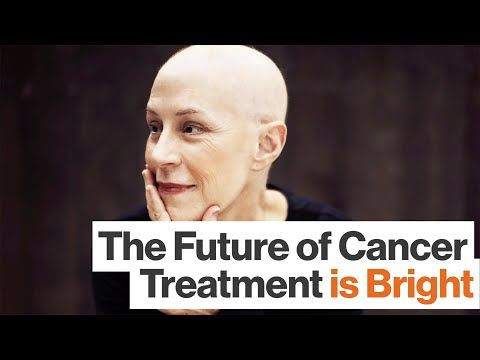Revolution In Cancer Treatment: 2 New Therapies May Help Patients 'Live Again'

Cancer can be devastating to the individuals and families it affects. The disease alters patients' routines, roles, and relationships with others. Luckily, in the age of cancer research, millions more Americans are surviving the horrible disease, showing that you can live with cancer rather than die from it. In Big Think's latest video, "2 New Cancer Treatments That Give Patients Hope Again," medical researcher Dr. David Agus explains two current revolutions in cancer therapy that could potentially eliminate all types of cancer.
The first treatment, known as immunotherapy, was successfully tested on former president Jimmy Carter. When cancer cells appear, they send out a "don't eat me" signal to the immune system. But now, there are drugs that can block that "don't eat me" signal, which allows the immune system to come in and "eat" — or attack — cancer cells. Immunotherapy has shown dramatic results with melanoma, kidney cancer, and some types of lung cancer. According to Agus, immunotherapy teaches you how to harness the power of your own immune system so that it can attack cancer on a more frequent basis than conventional chemotherapy treatments.
The second cancer treatment is known as precision, or personalized medicine. This means that if you have cancer, a doctor can take a piece of your cancer and sequence the DNA to look at which genes are “turned on” and which genes are “turned off.” The goal of this treatment is to develop a way to turn off the genes driving a particular cancer. Because this is still a developing therapy, though, it doesn't work on all patients.
"We don't have drugs to turn off every gene, but I can sequence the DNA of the cancer and develop a personalized therapy of that patient" Agus said in the video.
These new treatments reflect another way of thinking about cancer. In the 1800s, European doctors were classifying cancer by the body part it affected — hence breast cancer, prostate cancer, and lung cancer. Today, however, students and doctors are beginning to classify cancer by the genes that are driving the disease, which sometimes might apply to more than one cancer.
For Agus, “cancer is a verb and not a noun. ... You're cancering,” he said.
Cancer is something the body does, not something the body gets, he said. This philosophy provides a new way of approaching the disease, and encourages doctors to target and treat it with new, more effective therapies.



























